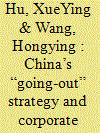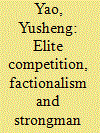|
|
|
Sort Order |
|
|
|
Items / Page
|
|
|
|
|
|
|
| Srl | Item |
| 1 |
ID:
156257


|
|
|
|
|
| Summary/Abstract |
China’s rapidly growing outbound foreign direct investment (OFDI) has attracted a great deal of concern about its impact on the recipient countries. But so far there has been little research on what effect the “going-out” strategy has had on China itself. This is an important question to study because the answer to it will shed light on what kind of an international actor China is becoming as it becomes further integrated with the global economy and what outside influence there can be on China’s domestic governance reform. This article explores the effect of investing overseas on Chinese companies in the area of corporate social responsibility (CSR). Through an analysis of an original sample of data, the authors find preliminary evidence of a positive impact of OFDI on Chinese companies’ commitment to CSR. More research will be needed to uncover the mechanisms and limitations of this apparent trend toward institutional convergence.
|
|
|
|
|
|
|
|
|
|
|
|
|
|
|
|
| 2 |
ID:
156255


|
|
|
|
|
| Summary/Abstract |
This article explores how the Chinese Communist Party has relied in part on making global financial markets and institutions a source of external pressure to help pass domestic economic and financial reform. We explore two case studies of external financial liberalization: the listing of Chinese state-owned enterprises on foreign stock exchanges and the financial reform aspects of the Shanghai Free Trade Zone. These studies show that external liberalization policies are interlinked with both micro- and macro-level reforms in the domestic economy. We conclude that, after 2005, this strategy of applying external pressure, in fact, did not lead to more comprehensive economic restructuring because the agents of external pressure—in this instance, foreign banks and accounting firms—were themselves party to the reinforcement of state control and ultimately did not (or could not) promote further external liberalization. Domestic agents that supported external liberalization were also quick to abandon it when external pressure conflicted with other domestic policy objectives.
|
|
|
|
|
|
|
|
|
|
|
|
|
|
|
|
| 3 |
ID:
156262


|
|
|
|
|
| Summary/Abstract |
This study examines the elite political competition in a large agrarian village in Hubei Province. Although known locally as well-governed, this village was actually a bifurcated political community with a host of problems. The power struggle between a few members of the village’s political elite in the past two decades focused on the office of village Party secretary and produced a polarized politics of factionalism. The town Party committee played a crucial role in selecting the village’s Party secretary for economic development with dubious results. This study also examines how and why a strongman Party secretary could hold on to power for 16 years despite an increasing opposition. It reveals the governing dilemma for a village that was hard to govern and the unintended consequences of the Party’s recruitment policy for village leaders. Through the elite competition for the past two decades this study aims to capture a total picture of the village politics including its political ecology, agency and dynamics.
|
|
|
|
|
|
|
|
|
|
|
|
|
|
|
|
| 4 |
ID:
156258


|
|
|
|
|
| Summary/Abstract |
This article explores the magnitude, motivations, and mechanisms of the globalization of Chinese finance for energy. Like the national development banks and export–import banks of industrialized countries before them, China’s policy banks have provided large amounts of financing to Chinese energy companies to enter global energy markets. What is more, China’s two global policy banks, the China Development Bank and the Export–Import Bank of China, now provide as much energy finance to foreign governments as do all the multilateral development banks combined. This paper outlines the extent to which Chinese energy finance has become globalized and examines the state priorities and institutional pathways that drive the globalization of Chinese energy finance.
|
|
|
|
|
|
|
|
|
|
|
|
|
|
|
|
| 5 |
ID:
156264


|
|
|
|
|
| Summary/Abstract |
Using data from a survey of rural migrants of P district in Shenzhen in 2013, this article explores marital violence among rural migrants. It investigates whether immigrants who witnessed interparental violence or experienced physical violence during childhood are more likely to be emotionally or physically violent in their own marriage. It also finds that the prevalence of mutual violence between rural migrant couples is significantly higher than unilateral violence, and emotional violence is the most common type of marital violence. Witnessing interparental violence in childhood increases the likelihood in adulthood of perpetrating both emotional and physical violence for females but only of emotional violence for males. There is a correlation between experience of physical abuse during childhood and perpetration of physical or emotional abuse during adulthood.
|
|
|
|
|
|
|
|
|
|
|
|
|
|
|
|
| 6 |
ID:
156260


|
|
|
|
|
| Summary/Abstract |
An emerging body of literature views authoritarian elections as an institutional tool utilized by ruling elites to sustain power. However, like a double-edged sword, elections may also destabilize authoritarian regimes and trigger the process of democratization. How do authoritarian rulers make sure elections serve their purposes? What electioneering mechanisms do they employ to engineer electoral victory? Do electoral institutions matter in single-party regimes? Based on intensive fieldwork, this article will lay out for the first time a menu of controlling strategies and tactics deployed in China’s direct congressional elections. Drawing on these mechanics allows local electoral authorities to play by the rules as they manufacture electoral certainties for the Communist Party. Furthermore, the political logic of ‘socialist democracy’ and its operationalization in local congressional elections will also be discussed. A closer look at the micro-level dynamics of authoritarian elections may help develop our understanding of why there has been a mixed record of ‘democratization by elections’.
|
|
|
|
|
|
|
|
|
|
|
|
|
|
|
|
| 7 |
ID:
156263


|
|
|
|
|
| Summary/Abstract |
Based on ethnographic fieldwork among migrant worker NGOs conducted between 2011 and 2016, this article employs critical theories of citizenship to illustrate how migrant worker NGOs use a strategy of ‘resistance through accommodation’ to re-shape the citizenship regime and discourse in China. The dominant literature on labour activism tends to discount the potential for migrant worker NGOs to undertake resistance, on account of their dependency upon the state and the market. The article contends that while NGOs must engage in relations with the state and the market to ensure their own survival, their activism does not ultimately centre on either resisting or accommodating these actors directly, but rather upon a broader engagement process aimed at the strategic purpose of ‘citizenship transformation’.
|
|
|
|
|
|
|
|
|
|
|
|
|
|
|
|
| 8 |
ID:
156259


|
|
|
|
|
| Summary/Abstract |
The article analyzes the resumption of China’s exchange rate reform from June 2010. It finds that, while the Congress’s influence on the RMB issue generally diminished over time after the global financial crisis, international criticism and pressure from the US administration and the IMF still played an important role of agenda-setting in China’s exchange rate policy-making in 2010. The Chinese leadership stood firm to the external pressure and demonstrated solidarity and consistency towards the exchange rate policy. It argues that, with the development of RMB internationalization and increasing capital account openness, a flexible exchange rate was the feasible choice to preserve the independence and effectiveness of China’s monetary policy, which produced the Chinese leadership’s consensus on the RMB exchange rate reform in 2010. The RMB appreciated steadily and gradually against the dollar in the second round of exchange rate reform, aiming to improve confidence and promote the international use of RMB.
|
|
|
|
|
|
|
|
|
|
|
|
|
|
|
|
| 9 |
ID:
156256


|
|
|
|
|
| Summary/Abstract |
Will China’s currency, the renminbi (RMB), become a major international reserve currency that rivals the US dollar in the next decade? This article argues that this is unlikely for domestic political and economic reasons. China has some important systemic advantages that other recent challengers to the dollar have lacked, such as a large economy, a major role in the international trading system and substantial military capabilities. However, China’s domestic political system poses an important barrier to the internationalization of its currency. Chinese political institutions and financial policies reduce the attractiveness of the RMB as a reserve currency. Strong opposition to financial reform from Chinese interest groups has blocked reforms that would enhance the RMB’s attractiveness, and is likely to prevent substantial liberalizing reform in the future. Moreover, changes in China’s political economy during the Xi Jinping era (2012–present) have exacerbated these domestic deficiencies. Due to these various domestic political obstacles, the RMB is unlikely to emerge as a top reserve currency in the next ten years.
|
|
|
|
|
|
|
|
|
|
|
|
|
|
|
|
| 10 |
ID:
156261


|
|
|
|
|
| Summary/Abstract |
Many China analysts believe Beijing relies on nationalism to shore up its legitimacy of rule and its recent assertiveness, especially in salient territorial issues, is increasingly defined by such nationalism. However, based on a critical review of the existing studies, this article doubts the validity of this nationalism-foreign-assertiveness nexus because most questions that are important and necessary to elucidate the causal mechanisms remain largely unanswered, therefore making this popular narrative biased and somewhat flawed. This article addresses four questions as follows: what Chinese nationalism is, how ‘rising’ nationalism is in China, Beijing’s attitudes towards nationalism, and its foreign policy implications. This article concludes that nationalism’s foreign policy effects may be more moderate than most have assumed, and thus calls for intellectuals’ efforts to move beyond the stereotyped image and make further rigorous analysis.
|
|
|
|
|
|
|
|
|
|
|
|
|
|
|
|
|
|
|
|
|